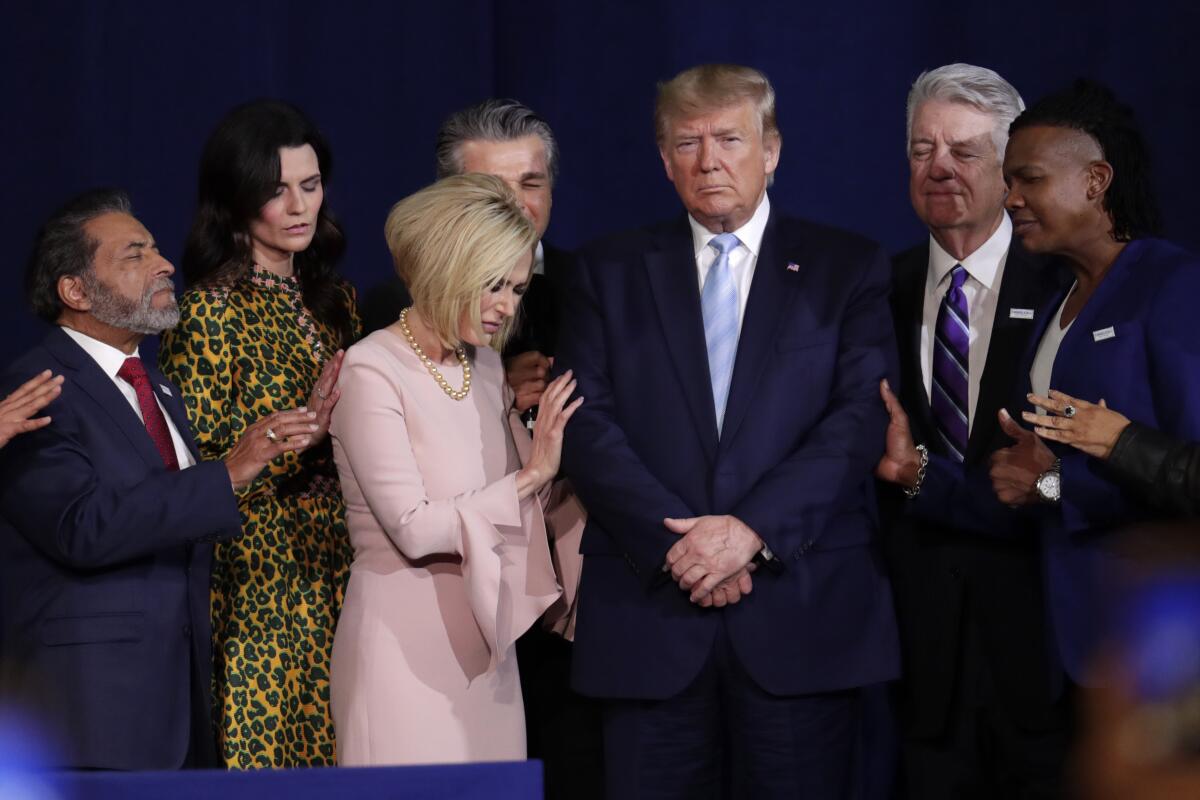Evangelicals have a role in political life. It isn’t fawning over Trump

- Share via
There have been many surprises in the wake of my Dec. 19 Christianity Today editorial, in which I questioned President Trump’s moral fitness for office as well as his unabashed support among most conservative evangelicals. But no surprise has been greater than the cheering of atheists, agnostics, Jews and former evangelicals. They responded with grateful emails, subscriptions and donations to the magazine.
The episode has opened my eyes to one crucial role that evangelical religion, and religion in general, must play in the nation’s life: To speak and act in the public square in ways that are consistent with the theology and ethics of evangelical faith.
By this I do not advocate deeper involvement in the drama of partisan politics. Contrary to what some critics said, the editorial was not about the magazine “becoming political.” Careful readers saw that my argument was moral and religious rather than political.
Many Christians are deeply troubled by the inconsistency of Trump’s evangelical supporters and their refusal to measure the president’s behavior in office by their own ethical standards. That failure stands in sharp contrast to their reaction to Bill Clinton’s moral failings, boldly summed up in a 1998 Southern Baptist resolution. “We implore our government leaders to live by the highest standards of morality both in their private actions and in their public duties,” it read, “and thereby serve as models of moral excellence and character.” This sentiment appears all but forgotten when it comes to measuring the current president.
Evangelicals are latecomers to partisan politics, of course. Mainline Christianity was at center stage in the 1960s and ’70s, when Congregationalists, Presbyterians, Episcopalians, Methodists, among others, used their national gatherings to weigh in on every hot-button political issue, taking stands that often merely mirrored the platform of the Democratic Party. Their early moral support of the civil rights movement is to be praised; their conclusion that politics was the way to stay relevant is today recognized as a mistake, a leading cause of both a decline in membership and, ironically, in loss of relevance.
It’s not that Christians should avoid the give and take of political life. As citizens in a democracy, participation in political arm wrestling is not only a right, but a duty. The duty, however is mostly an individual one, with religious bodies weighing in with moral judgments only at crucial moments. It is a sure sign of a church’s internal decay when the sum and substance of its religious guidance becomes entwined with political partisanship, especially when loyalty to a political figure is equated with loyalty to God.
At one recent Trump rally, held by a group called Evangelicals for Trump, the opening prayer included these words: “We declare that no weapon formed against him will be able to prosper and every demonic altar erected against him will be torn down” and that “he will rise high, and he is seated in the heavenly places.” In the Christian community, we call that idolatry.
It is no wonder that Trump-supporting evangelicals don’t comprehend the moral gravity of the lies and contempt that characterize Mr. Trump’s words, and that they excuse the manifold corruptions of his office. He’s a political messiah, after all; by definition, he can’t do wrong.
And yet... The most serious problem we Christians face today is not idolatrous politics. That’s a mere symptom of a deeper disorder, one that transcends left and right, mainline and evangelical, Catholic and Protestant. As I’ve written elsewhere, and argue in a forthcoming book, I believe that what Alexander Solzhenitsyn said about America in his 1983 Templeton Prize address applies specifically to Christians in America today: We have forgotten God.
Some assume I champion a retreat into a life of private devotion, and thus a withdrawal from engagement. Far from it. But we too often step into the public square clumsily and trip over our own moral ideals because we have forgotten our First Love. We fail to recall that the one gift we have to offer the nation is not a partisan vote, but a consistent moral voice grounded in God’s love for us and our love for God.
Christianity Today’s nonreligious supporters certainly do not agree with everything the magazine stands for. An evangelical such as me hopes, of course, that they will now study and consider the more spiritual claims we make. But even if that’s never the case, their support was an affirmation that they rightly expect the religious to be consistent with their faith’s teaching — and to have the courage to speak up about serious moral issues, even if our words have to be directed at a party or leader we otherwise sympathize with.
To be sure, Christianity has much more to offer than this — for one, a life of transcendence shaped by Christ’s self-sacrificing love. But striving for integrity in word and deed in the public square — that’s the least we can do for the nation.
Mark Galli is a public theologian, former editor in chief of Christianity Today, and author of the forthcoming “When Did We Start Forgetting God: The Root of the Evangelical Crisis and Hope for the Future.”
More to Read
A cure for the common opinion
Get thought-provoking perspectives with our weekly newsletter.
You may occasionally receive promotional content from the Los Angeles Times.









